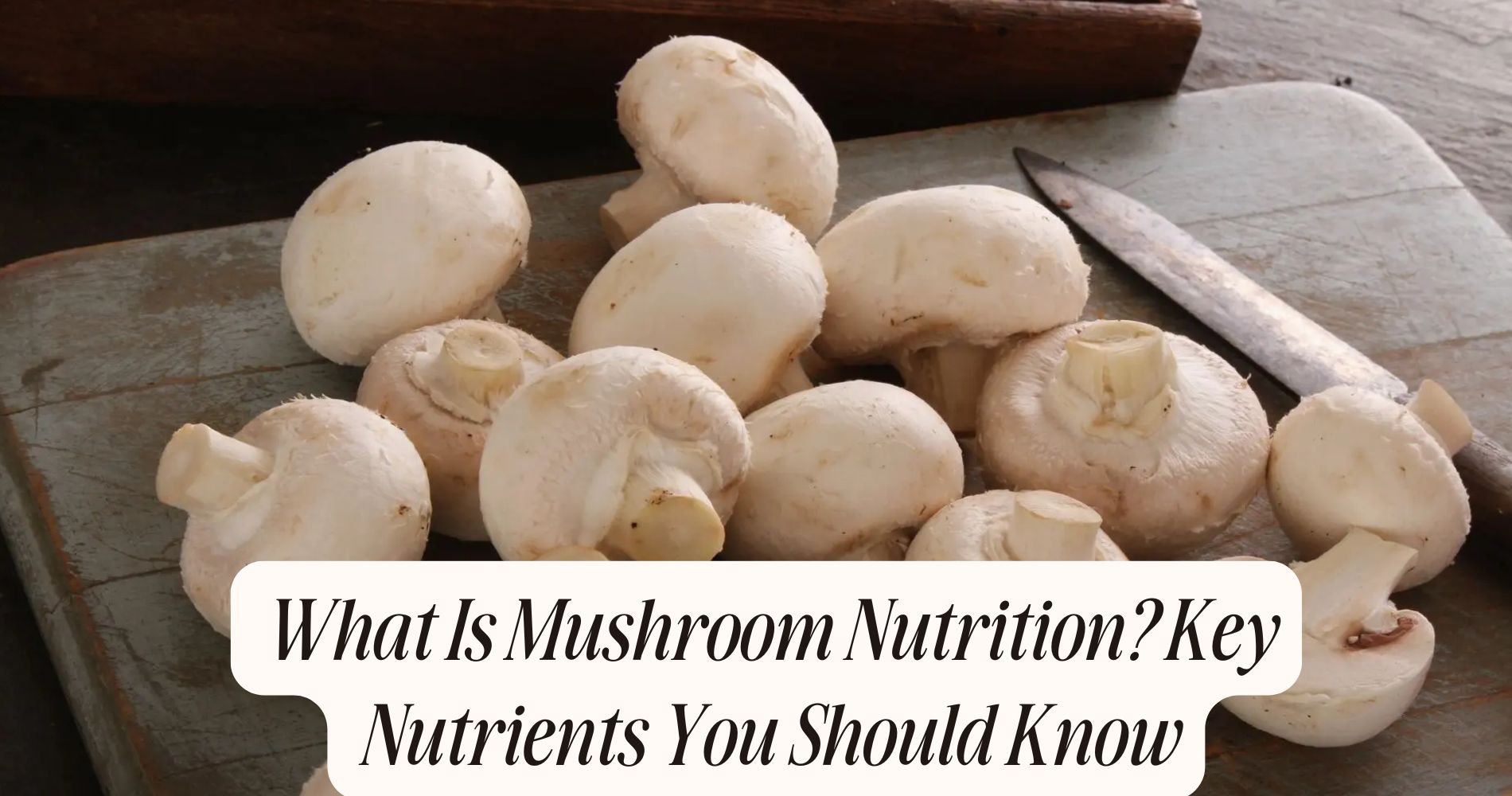
What Is Mushroom Nutrition? Key Nutrients You Should Know
What is mushroom nutrition? Mushrooms are more than just a culinary delight; they offer a unique blend of nutrients that can enhance your overall health. Rich in essential B vitamins and minerals, these fungi play important roles in energy metabolism and immune support. Their low calorie count makes them an excellent choice for various diets. Curious about the specific nutrients and health benefits they provide? Let’s explore the key components of mushroom nutrition that can benefit you.
The Nutritional Profile of Mushrooms
Mushrooms are a unique addition to your diet, packing a punch when it comes to nutrition. With numerous mushroom varieties available, each brings its own distinct flavor and nutritional benefits.
For instance, shiitake mushrooms are known for their immune-boosting properties, while portobellos offer a hearty, meaty texture that lends itself well to various culinary uses. You can sauté, grill, or roast them, enhancing many dishes from pastas to salads.

Additionally, mushrooms are low in calories yet rich in essential nutrients, including fiber and antioxidants. Incorporating different mushroom varieties into your meals not only adds depth to your cooking but also supports your overall health.
Vitamins Found in Mushrooms
While you may be familiar with mushrooms as a flavorful ingredient, they also serve as an excellent source of essential vitamins. Different mushroom varieties, such as shiitake, maitake, and button mushrooms, pack a nutritional punch.

These fungi are particularly rich in B vitamins, including riboflavin, niacin, and pantothenic acid, which play vital roles in energy metabolism and brain health. Additionally, some mushrooms, like chanterelles, provide a good dose of vitamin D when exposed to sunlight, making them unique vitamin sources.
Including a variety of mushrooms in your diet can help boost your overall vitamin intake, supporting various bodily functions and enhancing your well-being.
Essential Minerals in Mushrooms
When it comes to nutrition, mushrooms aren’t just a source of vitamins; they’re also packed with essential minerals that are important for your health.
These fungi offer an impressive range of essential minerals, including selenium, potassium, and copper. Selenium plays a key role in antioxidant defense, helping to protect your cells from damage. Potassium is necessary for maintaining healthy blood pressure and proper muscle function. Copper supports your immune system and aids in iron absorption, promoting overall well-being.
Antioxidants: The Health Benefits of Mushrooms
Packed with potent antioxidants, mushrooms offer a remarkable array of health benefits that can enhance your overall well-being.
The antioxidant properties of various mushroom varieties, such as shiitake, maitake, and reishi, help combat oxidative stress, which is linked to chronic diseases and aging.
These antioxidants, including ergothioneine and selenium, support your immune system and may reduce inflammation in your body.

Incorporating mushrooms into your diet can also promote heart health by improving cholesterol levels.
Additionally, their unique compounds can potentially lower the risk of certain cancers.
Dietary Fiber and Its Importance
Dietary fiber plays an essential role in maintaining your overall health, and incorporating mushrooms into your diet can greatly boost your fiber intake.
Mushrooms are excellent fiber sources, providing both soluble and insoluble fiber, which can enhance your digestive health. Soluble fiber helps regulate blood sugar levels and lowers cholesterol, while insoluble fiber promotes regular bowel movements and prevents constipation.
By adding mushrooms to salads, soups, or stir-fries, you can easily increase your daily fiber consumption. Research shows that a high-fiber diet can also reduce the risk of chronic diseases, such as heart disease and diabetes.
Protein Content in Mushrooms
Mushrooms are surprisingly rich in protein, with about 3 grams of protein per 100 grams of the edible variety. This makes them an excellent option for those seeking plant-based protein sources.
While they may not match the protein content of meat or legumes, mushrooms still offer a significant contribution to your daily intake. They contain essential amino acids, which are crucial for muscle repair and overall health.
Incorporating mushroom protein into your diet can enhance meals, whether you’re adding them to salads, soups, or stir-fries. Plus, their unique umami flavor can elevate your dishes without the need for excess salt or fat.
Low-Calorie Benefits of Mushrooms
When looking to maintain or lose weight, incorporating low-calorie foods into your meals can be beneficial, and mushrooms fit the bill perfectly.
These versatile fungi are low in calories, making them excellent low-calorie snacks that satisfy hunger without packing on the pounds. For instance, one cup of raw mushrooms contains roughly 15 calories, allowing you to enjoy sizable portions without guilt.
Their rich umami flavor can enhance dishes, reducing the need for higher-calorie ingredients. Including mushrooms in your diet can also provide essential nutrients while supporting weight management efforts.
Mushrooms and Immune Support
While many foods contribute to immune health, mushrooms stand out due to their unique composition of bioactive compounds. Certain mushroom varieties, like shiitake, maitake, and reishi, are particularly known for their immune-boosting properties.
These fungi contain polysaccharides, such as beta-glucans, which can enhance the activity of immune cells, helping your body fend off infections. Additionally, mushrooms are rich in antioxidants, which combat oxidative stress and support overall immune function.

Regularly including these nutrient-dense varieties in your diet can bolster your immune system, making it better equipped to handle illnesses. So, whether you enjoy them sautéed, in soups, or salads, mushrooms can play a key role in maintaining your health and well-being.
How to Incorporate More Mushrooms Into Your Diet
Incorporating mushrooms into your diet is a simple yet effective way to enhance your meals and boost your health.
Start by exploring various mushroom recipes that can easily fit into your weekly menu. Sauté them with garlic and olive oil for a quick side dish, or add them to soups and stews for extra flavor and nutrients. You can also grill or roast mushrooms to bring out their umami taste.
Experiment with different cooking techniques—like stir-frying or baking—to discover your favorite ways to enjoy them. Try adding mushrooms to omelets, pasta dishes, or salads for added texture and health benefits.
With endless possibilities, it’s easy to make mushrooms a staple in your diet!
Your Daily Dose of Mushroom Power
Looking for an easy and delicious way to enjoy the benefits of mushroom nutrition? Try SUPER MUSHROOM GUMMIES from Well Gummies. Each chew is packed with 10 functional mushroom varieties to help fuel your brain, support immunity, and deliver sustained energy—all without the crash. With a fresh wild berry flavor and zero jitters, these vegan-friendly gummies make wellness feel like candy. Convenient, powerful, and perfect for your daily routine.
Frequently Asked Questions
Can Mushrooms Be Toxic or Cause Allergic Reactions?
Yes, mushrooms can be toxic and cause allergic reactions. Certain species contain harmful compounds leading to mushroom toxicity. Always identify mushrooms accurately, and if unsure, avoid consuming them to prevent potential health risks.
How Should Mushrooms Be Stored for Freshness?
To keep mushrooms fresh, store them in paper bags, not plastic. Refrigeration tips include placing them in a ventilated storage container to prevent moisture buildup, which can lead to spoilage. Enjoy your fresh mushrooms longer!
Are There Any Mushrooms That Are Particularly High in Nutrients?
Certain mushroom varieties, like shiitake and maitake, are particularly high in nutrient density. They provide essential vitamins, minerals, and antioxidants, helping you enhance your diet and support overall health with their rich nutritional profile.
What Are the Best Cooking Methods to Retain Mushroom Nutrients?
To retain mushroom nutrients, try steaming benefits for gentle cooking, preserving vitamins. Alternatively, use sautéing techniques with minimal oil and quick cooking times. Both methods enhance flavor while maintaining nutritional value, so you enjoy healthier mushrooms.
Can Mushrooms Interact With Medications or Supplements?
Mushrooms can interact with certain medications, affecting their efficacy. It’s essential to consult your healthcare provider about mushroom safety, especially if you’re taking anticoagulants or immunosuppressants, to avoid potential medication interactions and guarantee your health.
Conclusion
Incorporating mushrooms into your diet is a smart choice for boosting your overall health. With their rich array of vitamins, essential minerals, antioxidants, and dietary fiber, these low-calorie fungi can enhance energy metabolism, support immune function, and promote digestive health. Whether you add them to salads, stir-fries, or soups, you’ll enjoy their nutritional benefits. So, make mushrooms a regular part of your meals and reap the rewards of their powerful health-promoting properties.




